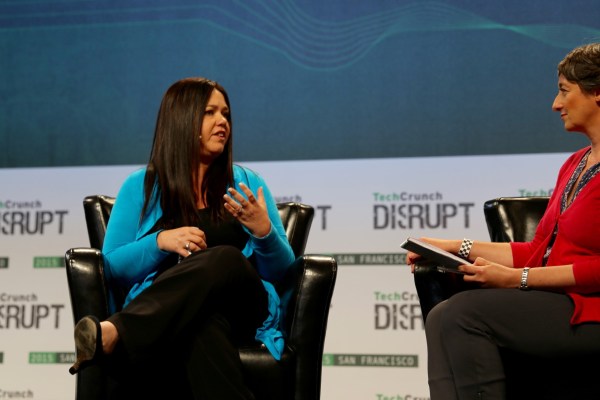Houzz co-founder and CEO Adi Tatarko says she wants to redefine the word “unicorn” in tech industry lingo. The term, which refers to companies whose valuations are in the billion-dollar range, could easily apply to what Tatarko and her husband Alon Cohen built with Houzz, a company that now sees 35 million unique visitors per month, and over 800,000 home professionals like architects, decorators, and contractors engaging on the service. After all, Houzz has a rumored valuation of $2.3 billion as its last fundraising round, easily making it a member of the so-called “unicorn club.”
But speaking on stage at the TechCrunch Disrupt event this morning in San Francisco, Tatarko admitted that she didn’t like the term “unicorn,” and wanted to offer a different definition. Unicorns are magical creatures by nature, she explained, so she’d rather see startups dubbed “unicorns” judged by different metrics.
“I would like to see them judged by the magic they bring to industries and their users, rather than their price tag by investors,” stated Tatarko. “The magic is about the transformation [they bring to industries],” she explained.
The CEO wouldn’t confirm (or deny) her own company’s valuation or total funding, though CrunchBase reports the home remodeling and design-focused online marketplace has raised nearly $214 million from a number of top-shelf investors, including Sequoia Capital, KPCB, NEA, DST and others.
But the secret to Houzz’s success – and its ability to attract this level of VC interest and its own unicorn-level valuation – has been the company’s heads-down focus on product, not hitting funding milestones.
[gallery ids="1213989,1213988,1213987,1213985,1213984,1213991"]
The company actually started off fairly modestly as a side project by a husband-and-wife team who were interested in building a product they needed for themselves, while they struggled through their own remodeling project back in 2009. (That project finally completed this year, Tatarko noted today with a smile, but admitting that her redecorating never ends.)
Instead of focusing on getting investors, Houzz bootstrapped in its early days, learning from consumers and service professionals about what they liked, and then responded accordingly.
“We were bootstrapping for a long time,” says Tatarko, “but product was our first priority from day one.” The goal was always to follow their own passion and create a product the team loved and people around them really loved, she continued.
While Tatarko admits that’s not something that’s possible for every startup, Houzz’s focus on product actually brought investors to their door. “Many founders have to prove to investors that they have a good product and they are the ones to scale it,” she says. Houzz did not. The proof was in the startup’s organic traction and growth and the passion of its community.
With the funds available and its business model, Tatarko says Houzz is “fine for a long time” with regard to raising more money, and isn’t champing at the bit to raise more just because they can in today’s somewhat frothy climate. But that doesn’t mean an IPO is on Houzz’s near-term roadmap, either, the CEO said.
While the company is keeping its options open, for the time being, Houzz is committed to remaining a private company.
Instead of going public, Houzz is looking to expand its footprint worldwide. In the U.S. and Europe alone, the home remodeling and design industries combined are a trillion-plus-dollar market, but there’s still room to grow in other regions while also expanding beyond just home design and projects, as Houzz did when it acquired GardenWeb this summer, Tatarko said.
